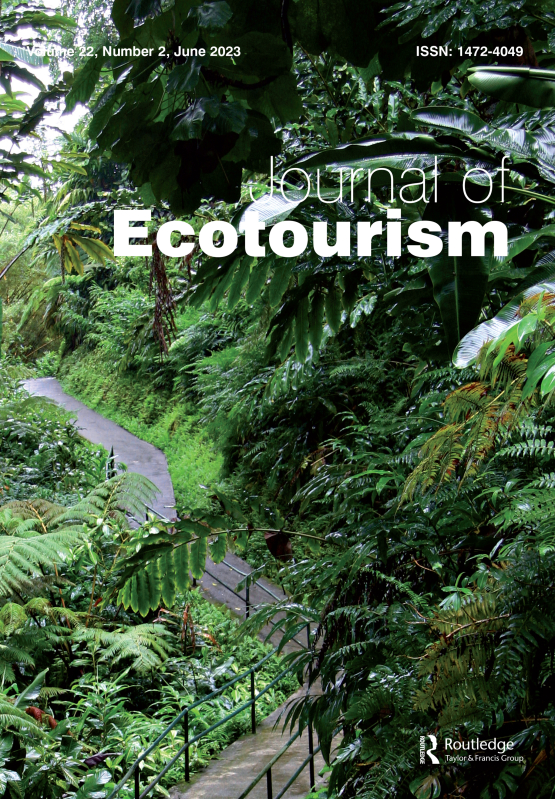Submit a Manuscript to the Journal
Journal of Ecotourism
For a Special Issue on
Exploring the Role of Virtual Reality, Augmented Reality, Conservation, and Responsible Travel in Ecotourism
Manuscript deadline
30 November 2024

Special Issue Editor(s)
Umair Akram,
The Business School, RMIT University, Ho Chi Minh, Vietnam
[email protected]
Muhammad Junaid,
School of Management, Asian Institute of Technology, Thailand
[email protected]
C. Michael Hall,
Department of Management, Marketing and Tourism, University of Canterbury, New Zealand
[email protected]
Heesup Han,
College of Hospitality and Tourism Management, Sejong University, Korea
[email protected]
Exploring the Role of Virtual Reality, Augmented Reality, Conservation, and Responsible Travel in Ecotourism
Ecotourism, a form of sustainable tourism that prioritizes environmental conservation and community well-being, is experiencing a transformative phase with the integration of Virtual Reality (VR) and Augmented Reality (AR) technologies. The potential of these technologies to enhance ecotourism experiences, contribute to conservation efforts, and foster responsible travel practices has sparked a growing interest within the academic and industry communities. This Special Issue, titled "Exploring the Role of Virtual Reality, Augmented Reality, Conservation, and Responsible Travel in Ecotourism," seeks to unravel the intricate dynamics between immersive technologies, environmental stewardship, and sustainable travel practices.
The utilization of VR and AR in ecotourism holds promise for providing visitors with immersive, educational, and engaging experiences that go beyond traditional methods of interpretation. These technologies not only offer a glimpse into remote and fragile ecosystems but also have the potential to influence visitor behavior towards more responsible and conservation-oriented practices. As we embark on this exploration, it is essential to ground our understanding in rigorous academic inquiry that examines the nuanced interactions between technology, ecotourism, and environmental conservation.
The rationale for this special issue lies in addressing the evolving landscape of ecotourism in the digital age and the imperative to understand the implications of incorporating VR and AR technologies. Recent studies (e.g., Gössling et al., 2021; Li et al., 2020) highlight the potential of immersive technologies in fostering environmental awareness and conservation practices. However, there is a critical need for in-depth academic exploration to unpack the multifaceted impacts and challenges associated with the integration of VR and AR into the ecotourism paradigm.
Furthermore, the concept of responsible travel within ecotourism is gaining prominence, emphasizing ethical considerations and community engagement (Fennell, 2018). VR and AR have the capacity to shape the way travelers perceive and engage with destinations, influencing their travel choices and behaviors. This special issue aims to contribute scholarly insights that critically assess the role of virtual technologies in shaping responsible travel practices within ecotourism contexts.
Scope of the Special Issue:
This special issue invites original research articles, reviews, and theoretical papers that delve into the intersection of virtual reality, augmented reality, conservation, and responsible travel within the realm of ecotourism. Topics of interest include, but are not limited to:
- Virtual and Augmented Reality Applications in Ecotourism:
- Exploration of innovative VR and AR applications that enhance ecotourism experiences.
- Use of virtual technologies to simulate ecotourism destinations and wildlife encounters.
- Conservation Through Technology:
- Assessing the contribution of VR and AR in raising awareness about environmental conservation.
- Applications of technology in monitoring and protecting natural habitats and wildlife.
- Educational Experiences and Interpretation:
- Examining the role of virtual technologies in providing educational content about ecosystems, biodiversity, and conservation efforts.
- Enhancing interpretive experiences for ecotourists through immersive technologies.
- Responsible Travel and Ethical Considerations:
- Exploring how VR and AR can influence responsible travel behavior.
- Ethical considerations in the use of virtual technologies in the ecotourism industry.
- Community Engagement and Empowerment:
- Investigating the potential of virtual technologies in involving local communities in ecotourism initiatives.
- Empowering local communities through responsible tourism practices facilitated by VR and AR.
- Sustainable Practices in Ecotourism Operations:
-
- Examining how VR and AR contribute to the implementation of sustainable and eco-friendly practices in ecotourism businesses.
- Inclusive Access to Ecotourism Experiences:
- Assessing the role of virtual technologies in providing inclusive access to ecotourism experiences for individuals with diverse abilities.
- Tourist Behavior Analysis:
- Investigating the impact of virtual experiences on tourist behavior, preferences, and decision-making in the context of ecotourism.
Looking to Publish your Research?
Find out how to publish your research open access with Taylor & Francis Group.
Choose open accessSubmission Instructions
Manuscript Submission Information:
Authors should select “Exploring the Role of Virtual Reality, Augmented Reality, Conservation, and Responsible Travel in Ecotourism” when submitting their paper to ScholarOne.
This special issue welcomes a variety of methodological approaches, including quantitative, qualitative, mixed-methods, and interdisciplinary studies. Contributions may include but are not limited to empirical research papers, literature reviews, conceptual frameworks, policy analyses.
Submission start: 30th April 2024
Submission Deadline: 30th November 2024
First round of reviews completed: 30th March 2025
Final acceptances: 25th May 2025
Inquiries related to the special issue, including questions about appropriate topics, may be sent electronically to the Guest Editor Dr. Umair Akram at [email protected]; [email protected]